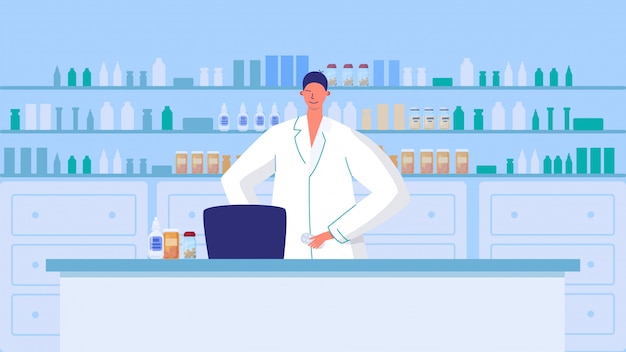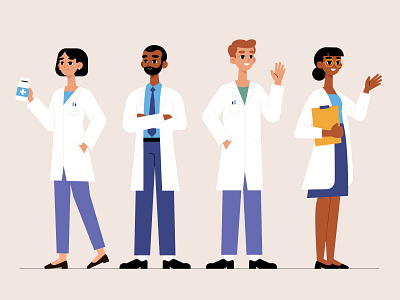STOP CONFUSING BETWEEN A DOCTOR AND A PHARMACISTS
Stevanie Callystasya Susilo
The pandemic situation has made a turning point in the history of disease and sickness. For people who got infected with any disease, there are people with the profession and responsibility to take care of the patients. These people who pursue that profession such as doctors or pharmacists took a long way to get to their place right now, but many people still misunderstood the meaning when pharmacists say that “I’m a doctor”. There is a significant difference between people who take the medical major and pharmacy major, such as their study material through college, field of work, and responsibilities
Medicine major and Pharmacy major are both majors from the branches of science. Medicine major focuses on scientific research on the molecular and cellular bases of disease and the application of this knowledge to the development of new tools, drugs, and clinical and diagnostic therapies. Including the teaching of cell biology, molecular biology, physiology, pharmacology, biochemistry, genetics, pathology, molecular immunology, research and quantitative methods, and biomedical research calculations. While people who pursue a pharmacy major, under the supervision of a pharmacist, pharmacy students prepare medicines, provide medicines and related assistance to patients, and manage the clinical and commercial operations of the pharmacy. Including medical and pharmaceutical terminology, pharmacology and pharmacy principles, drug identification, pharmacy laboratory procedures, prescription interpretation, patient communication and education, safety procedures, record-keeping, measurement and testing techniques, business operations pharmacy, prescription preparation, coordination, and dispensing operations.
Medicine major tends to study most core science courses in the first two years break the body down into systems, sometimes incorporating interconnected systems, and combine lectures with laboratory work. The pharmacy course aims to introduce various topics and cultures and to strengthen critical thinking and communication skills. This course provides students with scientific training and clinical skills to provide patient-centered team care in the evolving healthcare system (Kowarski, 2018). Although pharmacists must have a doctorate in pharmacy, they are not doctors or physicians. There are some differences between the two occupations, including the jobs that the law allows them to do. Medical school in the United States usually lasts four years but is often followed by residency and potentially fellowship (Fields, 2021). For those who want to become a doctor, this can represent a combined medical education of 10 years or more. While pharmacy school includes a four-year Doctor of Pharmacy program, followed by an optional one- or two-year residency program. As such, pharmacy school will take four to six years to complete for most graduates (Riggs, 2021). The first-year courses of medical major mostly focus on human body function, diseases, and clinical skills (Anatomy, Physiology, Body Function, Brain and Behavior, Epidemiology/Biostatistics, Foundations of Disease/Microbiology, Intro to Clinical Medicine, Developing Clinical Skills). Pharmacy major focuses on human anatomy, biomolecular, and chemistry (Molecular & Cellular Biology, Chemistry Lecture, and Lab, Calculus, Human Anatomy Lecture, Statistics). After finishing the first year, medical major students will continue to learn about medicine and surgery (Internal Medicine, Psychiatry/Neurology, Obstetrics and Gynecology, Pediatrics, Surgery, Geriatrics, Community and Preventive Medicine), while pharmacy major will learn microbiology and chemistry (Microbiology Lecture and Lab, Organic Chemistry Lecture and Lab, College Physics, Mammalian Physiology Lecture, and Lab).

You need a degree in medicine to become a doctor, but it can also lead you into alternative careers in many areas including lecturing, research, and scientific journalism. Jobs directly related to a medical degree include Anaesthetist, Cardiologist, Clinical radiologist, General practice doctor, Hospital doctor, Neurologist, Ophthalmologist, Pathologist, Psychiatrist, and Surgeon. As well as working as a community or hospital pharmacist, pharmacy graduates can also find opportunities in academia, the pharmaceutical industry, and with regulatory bodies. Jobs directly related to pharmacy degree include Community pharmacist, Hospital pharmacist, Research scientist (medical). Doctors have medical degrees and licenses to practice medicine, and they must meet residency requirements for their specialty (Riley, 2021). They examine patients, diagnose them with health problems, and determine their treatment plan, which may include prescribing medication. Meanwhile, pharmacists have Doctor of Pharmacy and pharmacy degrees, and they can complete a residency. While pharmacists can perform some basic medical procedures, such as giving patients a flu shot, they cannot prescribe medications or perform complex medical procedures. The pharmacist's first job is to make sure that the patient is taking the correct medication and knows how to take it. Doctors' responsibility to patients is to provide direct treatment to a patient, which may include assessing a patient's symptoms or injuries, diagnosing the patient, reviewing test results, counseling educates patients about treatment options, and treat patients by prescribing medications, referring them to specialists, or performing medical procedures. Pharmacist's responsibilities to patients are to ensure that patients take the medications prescribed by their doctors and know how to take them (Baker, 2019). They can also give general medical advice and perform basic medical tests on patients or vaccinate patients. They know the ingredients in the medicine you are taking and can give you advice on the best time to take it, possible interactions with other drugs or natural supplements, the risks, and the side effects of the drug. They can also give basic health and wellness tips.
Medicine major and pharmacy major may look similar just from the surface of the course, but if you investigate the details there are significant differences that occur in their study material, the field of work, and responsibilities. Learning more about these differences will help you to understand better which major that suits you and which major will be beneficial for your career.
Baker, R. (2019, October 21). Is a Pharmacist a Doctor? Retrieved from Baker & Gilchirst: https://www.bakerandgilchrist.com/blog/is-a-pharmacist-a-doctor/
Diamond, R. (2015, November 4). Typical Medical School Curriculum. Retrieved from Study.com: https://study.com/academy/popular/typical-medical-school-curriculum.html
Fields, K. C. (2021, April 30). What You Need to Know About Becoming a Pharmacy Major. Retrieved from US News: https://www.usnews.com/education/best-colleges/pharmacy-major-guide
Kowarski, I. (2018, December 13). How Long Is Medical School and What Is it Like? Retrieved from US News: https://www.usnews.com/education/best-graduate-schools/top-medical-schools/articles/2018-12-13/how-long-is-medical-school-and-what-is-it-like
Marinelli, R. (2021, March 9). What a First-Year Medical School Student Can Expect. Retrieved from US News: https://www.usnews.com/education/blogs/medical-school-admissions-doctor/articles/what-a-first-year-medical-school-student-can-expect
Pharmacol, C. (2014, September 19). A comparison of medical and pharmacy students' knowledge and skills of pharmacology and pharmacotherapy. Retrieved from PMC US National Library of Medicine National Institutes of Health: https://www.ncbi.nlm.nih.gov/pmc/articles/PMC4239972/
Riggs, H. (2021, January 7). How Long is Pharmacy School? Retrieved from KGI: https://www.kgi.edu/news/how-long-is-pharmacy-school/
Riley, E. (2021, August 19). Careers for Healthcare and Medical Majors. Retrieved from Affordable Colleges Online: https://www.affordablecollegesonline.org/college-resource-center/careers-for-healthcare-majors/




No comments:
Post a Comment